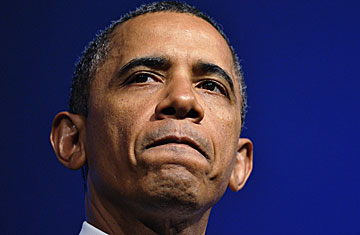
Amid a floundering economy and a looming re-election battle, the environment is going to come second for President Obama
Over the past few weeks, there have been two very distinct lobbying efforts directed at President Barack Obama over environmental and energy policy. One has been done very publicly — more than 1,000 activists, ranging from celebrities and scientists to former Obama campaign organizers — have been arrested outside the White House, protesting the proposed Keystone XL pipeline, which would transport half a million barrels a day of carbon-intensive crude from oil-sands developments in western Canada. The other effort has been a bit quieter: representatives from industry groups like the U.S. Chamber of Commerce and the American Petroleum Institute have heavily lobbied the White House to abandon a move by the Environmental Protection Agency (EPA) to strengthen air-pollution regulations that limit smog.
So which lobbying campaign won out? Maybe not the one you'd expect for a President who came into office two and a half years ago with the greenest credentials in recent memory. On Sept. 2, President Obama shocked his environmental allies when he pulled back the proposed tougher smog standards, despite the fact that the EPA had been promising stronger rules for months. Meanwhile, the Keystone XL pipeline — which needs White House approval — seems almost certain to go forward, with a State Department assessment last month seen as largely in favor of the project and Administration officials signaling their support. Big business won while activists and environmentalists lost out.
From the extreme to the mainstream, environmental groups reacted to Obama's announcement on smog with the fury of the scorned. It didn't help that Obama's political capital with environmentalists was already dwindling after his perceived failure to push through carbon cap-and-trade legislation and the gradual disappearance of global warming as a White House priority. Greens pondered aloud how a President they had worked so hard to elect, one who had pledged to put science before politics, could screw them over so badly — and they asked whether he was no longer worth the same effort in 2012. "Many MoveOn members are wondering today how they can ever work for President Obama's re-election, or make the case for his to their neighbors, when he does something like this," MoveOn executive director Justin Ruben said in a statement. "This is a decision we'd expect from George W. Bush."
Ouch. It doesn't get much worse than comparing Obama to a man widely considered to be the least environmental President ever. But has Obama really surrendered his green credentials, and given how uniformly hostile the Republican presidential candidates are to any form of environmental or climate policy, is there anything greens can really do about it?
First, a little background. Under the Clean Air Act, the Administration is required to review air-pollution regulations every five years, consulting the latest science to see whether rules need to be tightened to protect public health. Back in 2008, Bush's EPA set the new limit for ground-level ozone — the main ingredient of smog and a health hazard in its own right — at 75 parts per billion (ppb). That was tighter than the existing regulations, but considerably weaker than the 60 to 70 ppb recommended at the time by the EPA's own scientists.
Advocacy groups like the American Lung Association launched lawsuits to force the government to stop the Bush ozone regulations, which they argued would lead to thousands of unnecessary deaths; but when Obama took office, they announced a cease-fire at the behest of the new Administration. EPA head Lisa Jackson — who said that the Bush rules were "legally indefensible" — promised that the Administration would issue stronger ozone regulations that would fall into the 60- to 70-ppb levels recommended by the current science.
But industry groups screamed bloody murder over the possibility of tougher regulations, arguing that strict air-pollution rules could cost the economy as much as $90 billion a year by 2020. The EPA has said that the proposed regulations would still have net positive economic benefits, thanks to the reduction of premature deaths, hospitalizations and lost-worker productivity due to bad air. But with the economy worsening by the month and the White House increasingly seen as unfriendly to business, that was a tough argument to make, and EPA delayed the finalization of the new regulations again and again while always promising that they would eventually come. Finally on Sept. 2 — just before the Labor Day weekend — White House regulatory chief Cass Sunstein sent a letter to Jackson urging her to reconsider the new ozone regulations, adding that new rules "would create needless uncertainty" — essentially ending the debate.
